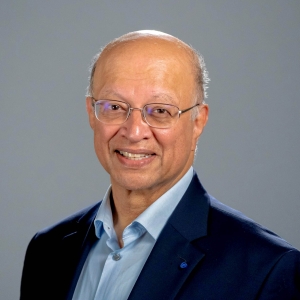Ashok Gadgil
423 Davis Hall
During Spring 2023 (for teaching weeks):
Tuesdays, 3:10 pm to 4:00 pm. Drop-in basis. If that time does not work and you need to meet, please email Prof. Gadgil, and he can organize a time.

Ashok Gadgil is the Andrew and Virginia Rudd Family Foundation Chair Professor of Safe Water and Sanitation and a Professor of Civil and Environmental Engineering at UC Berkeley. Gadgil’s research focuses on computational fluid dynamics of indoor air and pollutant flows, simulation of entry and transport of indoor radon, building energy efficiency, and methods to treat drinking water to make it potable. Gadgil holds a concurrent appointment as a Senior Faculty Scientist at Lawrence Berkeley National Laboratory (LBNL). He has more than 150 refereed archival journal papers, 140 conference papers, and several patents. Gadgil also received the prestigious Zuckerberg Water Prize, LBNL Director’s Award for Exceptional Achievement in Societal Impact, and the Patents for Humanity Award.
Ph.D., Physics, University of California, Berkeley, 1979
M.A., Physics, University of California, Berkeley, 1975
M.Sc., Physics, Indian Institute of Technology, Kanpur, 1973
B.Sc., Physics, University of Bombay, 1971
Gadgil’s research focuses on heat transfer, fluid dynamics, and technology design for development. Gadgil has substantial experience in technical, economic, and policy research on energy efficiency and its implementation - particularly in developing countries. Three of his best-known technologies for the developing world are "UV Waterworks" (a simple, effective, and inexpensive disinfection system for drinking water), the "Berkeley-Darfur Stove" (a low-cost sheet-metal stove that saves fuelwood in internally displaced person's camps in Darfur), and ECAR (ElectroChemical Arsenic Removal) for removing arsenic from water. Gadgil advocates for immediate and strategic action on the part of the research community to apply current scientific knowledge to address worldwide issues relating to climate change. Here are a few of the research projects Gadgil is currently working on below:
- Addressing arsenic contamination in Allensworth, California - Allensworth is an impoverished community in California’s Central Valley that relies on drinking water contaminated with naturally high levels of arsenic, a cancer-causing toxic contaminant. Gadgil’s research group has invented a rapid and effective technology to remove arsenic from water to levels below the maximum allowed by the EPA. This technology has been scaled up and is being field-tested in Allensworth with support from the local community and the State of California in collaboration with UC Berkeley’s School of Public Health. Here is a TV clip produced by the news channel Al Jazeera about this effort in Fall 2022.
- Air quality: Gadgil's current research explores clean-burning biomass stoves, and their adoption in communities in the developing world. His past research includes work on engineering science, design, and development of fuel-efficient, clean-burning, low-emission cook stoves for the 3 Billion people on the planet that still use biomass for cooking. LBNL is one of the best labs for measurements of cook-stoves efficiency and emissions.
- Various: Computational fluid mechanics and heat transfer, energy efficiency in buildings, environmental analysis applied to relevant problems in the industrial countries and developing countries. Another major multi-institution program that Gadgil led from 2021 to 2022 is the Development Impact Laboratory, or DIL.
News
Spotlights
No mentions in Spotlights
Student Updates
No mentions in Student Updates


